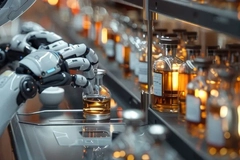IFF installs smart dosing robot to cut fragrance development timelines in Asia
Key takeaways
- IFF has introduced its Colibri robot at its Singapore fragrance production plant to accelerate and enhance precision in fragrance sampling.
- The system can produce 200 sample batches in eight hours, cutting time-to-market.
- Beauty companies like IFF, Givaudan, and L’Oréal are modernizing their operations through automation amid rising demand for “net-new” launches.

International Flavors & Fragrances (IFF) has introduced a smart dosing robot at its Chin Bee production facility in Singapore, aiming to speed up and improve precision in fragrance sampling for its customers across Greater Asia.
The technology, known as the Colibri robot, can create fragrance sample batches on demand within minutes. IFF says the technology marks a shift in how quickly it can move from initial ideas to formulated scent samples.
The move reflects the beauty industry’s global push to respond faster to consumer demands for new launches.
The fragrance company says the Colibri system operates four times faster than its previous setup and can handle multiple ingredients simultaneously. It is also touted to be able to produce 200 sample batches in eight hours and compound fragrance trials in seconds.
“[The installation of this new automation system] strengthens our ability to support demand in the region with enhanced speed, quality, and precision,” says Ramon Brentan, VP and regional general manager of Scent in Greater Asia, at IFF.
IFF describes the installation as part of its broader investment strategy in Greater Asia. The company adds that the technological expansion builds on other recent investments in Singapore, including the launch of IFF’s US$30 million Singapore Innovation Center.
Turnover tricks
IFF states that installing the Colibri robot at its cross-category Scent and Taste production plant marks a major step toward modernizing fragrance development processes in the region.
.webp) The Colibri system can produce 200 sample batches in eight hours, cutting time-to-market.The Chin Bee site joins IFF facilities in Neuilly, France, and Hilversum, Netherlands, that already use the Colibri system. In these facilities, implementing modernized perfumery processes reflects a wider industry shift: beauty brands increasingly recognize their traditional development systems are no longer fast enough to keep up with the growing consumer demand for quicker product launches.
The Colibri system can produce 200 sample batches in eight hours, cutting time-to-market.The Chin Bee site joins IFF facilities in Neuilly, France, and Hilversum, Netherlands, that already use the Colibri system. In these facilities, implementing modernized perfumery processes reflects a wider industry shift: beauty brands increasingly recognize their traditional development systems are no longer fast enough to keep up with the growing consumer demand for quicker product launches.
A previous report by Atelier and Accenture found that companies’ reluctance to modernize their operations is leaving around US$86 billion in potential revenue unclaimed.
According to the report, the number of “net-new” beauty launches has dropped to 46% in early 2024 compared to 63% in 2015, and 64% of shoppers want brands to respond faster to their demands.
Atelier notes that, despite strong consumer appetite, many brands operate with development cycles beyond a year.
“Brands are trapped in legacy thinking. They’ve built their operations around relationships and archaic processes that worked great 20 years ago but are now preventing them from growth,” Nick Benson, CEO at Atelier, previously told Personal Care Insights.
In the push for faster lead-to-market fragrances, companies are increasingly investing in their operations. Givaudan recently put CHF 40 million (US$50.2 million) into a “highly automated” fragrance production site in China to better respond to the region’s perfumery demands.
Moreover, L’Oréal invested €60 million (US$69.13 million) into its Gauchy facility earlier this month to double its fragrance production capacity.
The push for faster fragrance also aligns with a broader economic indicator where consumers turn to small, mood-boosting indulgences during financial uncertainty, a phenomenon dubbed the “lipstick effect.” Fragrance is emerging as a standout growth driver for beauty companies as consumers increasingly seek affordable luxuries.













